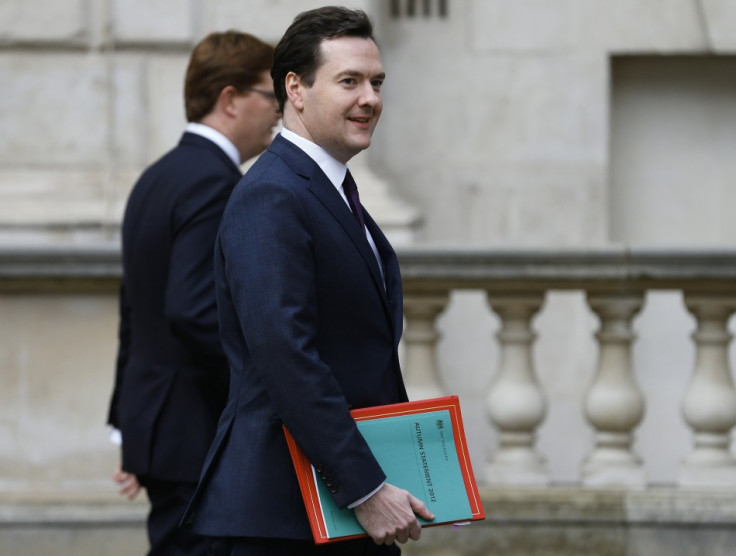Autumn Statement 2012: Osborne's Own Goal Leaves Him Empty-Handed

There isn't much point in guaranteeing victory in a three-legged race if you don't know whose knee you're going to be strapped to. You might be fairly confident of your own brisk pace but if your partner's had too much potato salad at the company picnic, you're not breaking the tape.
That's the problem with dependent guarantees - you can't meet them by yourself.
Something Chancellor George Osborne is no doubt coming to terms with now that he's told his disappointed colleagues and braying Opposition Members of Parliament that he's not going to meet self-imposed goals for the moving targets linked to the size of Britain's budget deficit and its overall debt pile.
Two of the three key planks in the Chancellor's economic architecture look to have cracked - but Osborne insists the underlying structure is sound: his non-partisan bookeepers at the Office for Budget Responsibility say he won't eliminate Britain's massive structural deficit until 2018, three years longer than previously vowed. He'll also need and extra year to meet his promise of having the country's overall debt shrink when measured against the value of its economy.
The third pillar - the Chancellor's spending plans - haven't changed a wit. In fact, he told the House today that we can expect the current austerity drive to last well in to 2018.
Economic growth, we're assured, will follow, but not as firmly as anticipated as recently at six months ago.
Maybe.
The US is slowing, Europe is sinking deeper into recession and our biggest trading partners aren't buying as much stuff from us they have in the past.
And there's the rub: because the language of economy has suddenly become mainstream - where the "simplify and exaggerate" mantra dominates - terms like "cut the deficit" have become commonplace and give rise to the belief that a country's finances should be run in the same way as a corner shop.
Government spending targets are based on assumptions of tax collection. If the tax take falls, spending either has to fall or the difference needs to be made up by borrowing. Predicting tax receipts in a perfect vacuum is difficult enough, in a slowing economy it's even more so and alongside the worst financial crisis in European history it is next to impossible.
And as deficit reduction goals become more difficult, borrowing needs to rise to plug the gap - even if your spending commitments continue to shrink.
The collection of moving measurements ensures that anything you predict in the spring be moot before the leaves change colour that autumn.
Which is why it's hard to find sympathy for the Chancellor as he loses control of Britain's economic narrative despite a series of headline achievements for he has only himself to blame for using the simplistic language of the shopkeeper when it was politically expedient and he sought to find distance from his Labour predecessors.
Along with Prime Minister David Cameron, Osborne has allowed the wholly irresponsible and demonstrably false idea that Britain could one day default on its debts permeate the national media and placed an almost religious commitment to maintaining a "AAA" credit rating from discredited analysts that sophisticated investors have resolutely agreed to ignore.
Mocking the notion that "more borrowing is a cure for too much debt" not only oversimplifies the role of government in the engineering of a healthy economy, it flies in the face of decades of evidence in the private sector that Osborne supposedly reveres.
The end result is that the coalition's achievements in real terms - job creation, lowest borrowing costs in history, surprising export growth - are drowned by its failures in the abstract - debt and deficit pledges that are largely out of their control and impossible to guarantee in the first place.
Headlines from the Autumn Statement will highlight little beyond "Osborne Misses Debt Pledge", delivering a loss for the Chancellor not only in political terms - only one in five voters trust him to manage the economy according to a Comres/ITV poll - but in economic terms as well as confidence wanes into a deeper downward spiral of reduced consumer spending, bank lending and foreign investment.
He who chases two rabbits catches neither, cautions the old Confucian adage.
Osborne wanted both the political and the economic capital when he set out his debt signposts two years ago.
And today he's empty-handed.
© Copyright IBTimes 2025. All rights reserved.





















